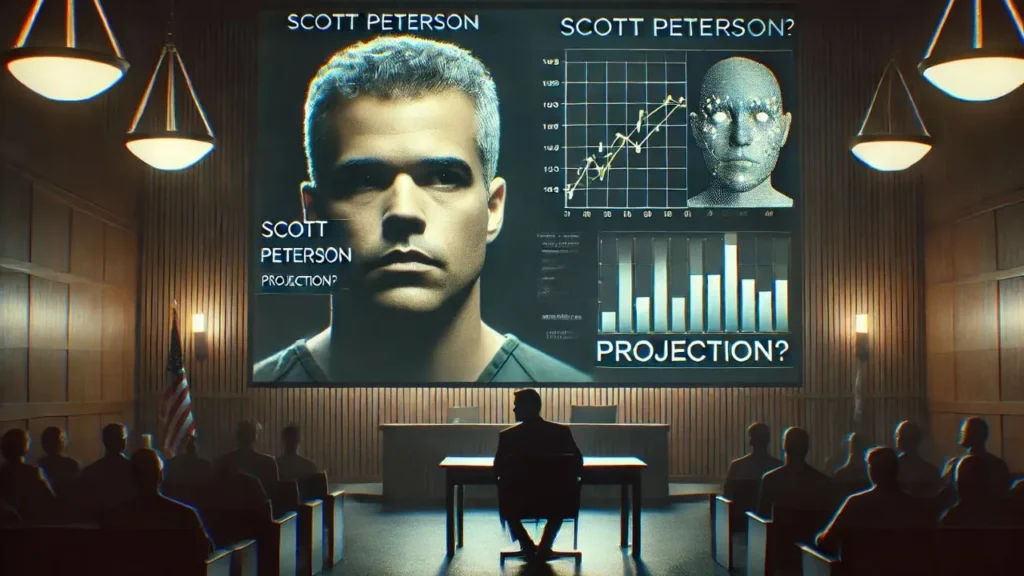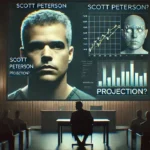The Scott Peterson case has captivated public attention for over two decades. Since his arrest in 2003 for the murder of his wife, Laci Peterson, and their unborn child, the case has remained a subject of intense debate. Beyond the legal arguments and evidence, there’s another layer that complicates the discussion: Theres A Lot Of Projection In The Scott Peterson Case.
Projection is a psychological concept where people attribute their own emotions, beliefs, or motives to someone else. In the Peterson case, this phenomenon has played a significant role, influencing media coverage, public opinion, and even the judicial process.
What is Projection “Theres A Lot Of Projection In The Scott Peterson Case”?
Projection often occurs when people struggle to confront their own uncomfortable thoughts or feelings. Instead of acknowledging them, they unconsciously assign these feelings to others. In high-profile criminal cases, this can result in people projecting their fears, insecurities, or moral beliefs onto the accused.
Examples of Projection in Daily Life:
- A person who is untrustworthy might accuse others of being dishonest.
- Someone feeling guilty might insist that another person feels guilty instead.
In the Scott Peterson case, projection took on multiple forms, from the media’s portrayal to public reactions.
How Theres A Lot Of Projection In The Scott Peterson Case
1. Media Coverage and Its Role in Shaping Narratives
From the moment Laci Peterson went missing, the media shaped Scott Peterson as the prime suspect. His calm demeanor, lack of public grief, and secret affair with Amber Frey were repeatedly highlighted. For many, these behaviors were incompatible with the image of a grieving husband.
But here’s where projection comes into play:
- Public Projection: Many viewers, already influenced by their personal experiences or societal expectations of how a “grieving spouse” should behave, projected their own ideas onto Scott. His failure to meet those expectations made him appear guilty in their eyes.
- Media Bias: The press focused on details that would provoke emotional reactions. Headlines centered around his affair, his fishing alibi, and even minor facial expressions. This selective coverage projected a narrative of guilt long before the trial began.
2. Public Reaction: Guilty Until Proven Innocent
Public opinion heavily leaned toward Scott’s guilt even before his trial began. This was partly due to the sensational media coverage but also because of the way people internalized the case.
Why?
- People tend to view high-profile crime cases through the lens of their own experiences. Someone who has experienced betrayal or loss might project those feelings onto the accused.
- Many saw Scott’s affair as a betrayal not just of his wife but of the ideal family image, projecting their own values about loyalty and morality.
User Experience: A Personal Perspective on Projection
To better understand this, let’s explore a real experience shared by a true crime enthusiast, Sara (name changed for privacy):
“When the Scott Peterson case first broke, I was quick to believe he was guilty. His calm, detached behavior reminded me of someone in my own life who had lied to me repeatedly. I found myself connecting the dots between Scott and my past experiences, even though they had no direct correlation. It wasn’t until I started reading about the legal details of the case that I realized how much of my opinion was shaped by my own projections.”
Sara’s experience illustrates how easily our personal baggage can cloud judgment, especially in emotionally charged cases.
3. Projection in the Legal System
Projection doesn’t stop with the media or the public. It also seeps into the legal system.
Jurors and Their Biases
Jurors are human and bring their own beliefs, values, and experiences into the courtroom. In Peterson’s trial:
- Some jurors admitted to feeling uneasy about his lack of visible emotion.
- Others confessed that his affair played a large role in their perception of his character, projecting their own moral judgments onto him.
Lawyers and Strategies
Both the defense and prosecution often rely on psychological tactics. Projection can be a double-edged sword:
- Defense: Peterson’s lawyers argued that the case against him was built more on public perception than hard evidence.
- Prosecution: Prosecutors played into public biases by emphasizing his affair and peculiar behavior.
Why Does Projection Matter?
Understanding projection is essential because it shows how perceptions can be skewed, especially in high-stakes cases like this.
Key Impacts of Projection in Such Cases:
- Skewed Public Opinion: Public pressure can influence legal outcomes.
- Unfair Trials: Biases among jurors can affect verdicts.
- Media Manipulation: Sensationalism can lead to rushed judgments.
For the justice system to function properly, it’s crucial to separate facts from feelings. Recognizing projection can help ensure that individuals are judged based on evidence, not preconceived notions or emotional reactions.
Key Elements of Theres A Lot Of Projection In The Scott Peterson Case
| Aspect | Example of Projection | Impact |
| Media Coverage | Focus on Peterson’s affair and demeanor | Shaped public opinion toward guilt |
| Public Perception | Viewing his calmness as evidence of guilt | Reinforced societal biases |
| Juror Bias | Judging his character based on infidelity | Potentially influenced trial outcome |
| Legal Arguments | Prosecutors emphasizing emotional narratives over evidence | Increased reliance on emotional appeal |
The Larger Implications of Projection
The Scott Peterson case isn’t unique in showcasing projection’s influence. Other high-profile cases, like those of Amanda Knox or Casey Anthony, have similarly seen public opinion swayed by projected emotions and beliefs rather than hard evidence.
Why It’s Important to Be Aware
Projection can:
- Derail justice: Innocent people may be convicted based on biased opinions.
- Impact society: It reinforces harmful stereotypes, such as equating certain behaviors with guilt.
For true justice, both the public and legal professionals need to actively question their biases.
Conclusion
The Scott Peterson case demonstrates how projection can distort reality, affecting everything from media coverage to legal proceedings. By becoming more aware of this psychological tendency, we can strive for a more objective and fair approach to justice.
Frequently Asked Questions (FAQs)
Q1: What is projection in the context of crime cases?
Projection involves attributing one’s own emotions or beliefs to another person. In crime cases, it can lead to biased perceptions of guilt or innocence.
Q2: How did projection affect the Scott Peterson case?
Projection played a role in shaping media narratives, public opinions, and even jurors’ views, potentially influencing the trial outcome.
Q3: Can jurors be unbiased in high-profile cases?
While jurors are expected to remain impartial, their personal biases and experiences can subconsciously influence their decisions.
Q4: How can the legal system minimize the impact of projection?
By emphasizing evidence over emotional narratives and ensuring diverse, well-informed juries, the legal system can reduce the influence of projection.
Q5: What lessons can we learn from this case?
It highlights the importance of separating facts from feelings and the need for critical thinking in forming opinions about legal matters.







